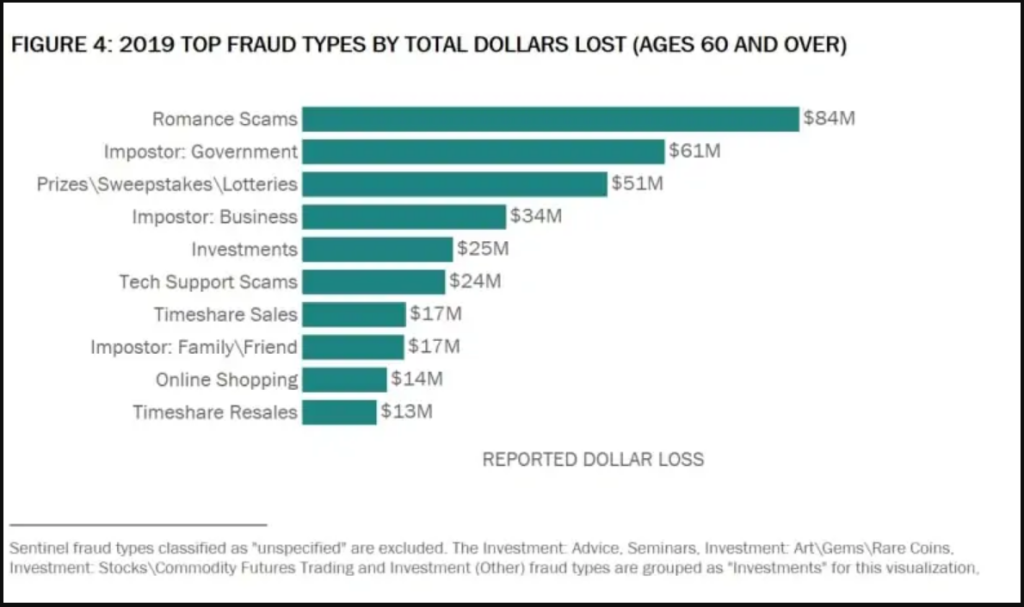
Table of Contents
Seniors lost over $3b to financial scams in 2020—their average losses were anywhere between double and triple that of victims half their age ($1300 and $320, respectively). In fact, the FBI estimates that about 28% of the $4.1b stolen from Americans that year came from people over the age of 60.
The elderly are an attractive target for scammers stooping for their pennies: they’re easily distracted, easily threatened, and have – on average – more disposable income than their socioeconomic colleagues who are still inundated with child-rearing expenses and mortgages. More dependent on others, they have n choice but to be more trusting; and their cognitive decline, not only impairs judgment but is also a source of embarrassment and fear, placing them in a defensive mode and often preventing their reporting a crime. And finally, of course, the exploits of the elderly struggling with the tech – life savings aside – are for the cyberthugs an endless source for humorous anecdotes.
Shopping and more - common phishing tactics
Phishing scammers employ a range of tactics to deceive their victims. Top of the list is shopping fraud, which involves relatively low sums, but is so prevalent it almost escapes our attention. This includes fake web shops, extortionist fees, and the usual slew of fake Amazon, eBay, payment service, and delivery notices we have all come to know and love. Unfortunately, the elderly are more prone to susceptibility and, as their mobility diminishes, dependent upon in its online forms.
In 2020, seniors filed over 14,000 complaints regarding undelivered merchandise to the tune of $40m.
Some other popular methods include:
Romance scams
Loneliness is a threat best tackled alone. It leads the elderly to wander around dating sites in an online jungle they have only recently learned to traverse. Scammers create fake profiles to establish relationships and, after gaining their trust, ask for money or personal information, claiming various emergencies or financial difficulties.

In 2019, romance scams accounted for over a quarter of all other types. The latest exploit to hit the press was the extradition from the UK of Mona Faiz Montrage from Ghana who, through her 4.2 million-strong Instagram account, spearheaded a crime organization that stole about $2m from elderly victims who were convinced they were in the midst of a relationship with her. The scam went as far as including fake marriage certificates!
IRS and government impersonation:
The older we get, the more reliant we become on public institutions—healthcare, social services, and so on. Unfortunately, as more and more of our interactions go online, the more threatening these become to the technophobic amongst us. Increasingly, scammers are posing as representatives from the Internal Revenue Service (IRS) or government agencies, contacting victims via phone or email. They claim that the victim owes unpaid taxes or has legal issues and demand immediate payment or personal information to resolve the matter. The fear of facing legal consequences is often viewed as a threat against our life’s savings—a form of coercion that leads to panic and quick knee-jerk compliance.
In 2016, the US Justice Department charged 61 members of an Indian-based call center with impersonating the IRS. Fifteen thousand people had been scammed out of about $50m. More recently, two members of another Indian-based operation were charged in the orchestration of an $11m scam that involved impersonating government officials convincing victims that their personal data had been compromised.
Email from a financial institution:
Financial services being the second most attacked sector in the cyberscam playbook, it isn’t surprising to find scammers posing as a reputable bank or financial institution, requesting users to update their account information urgently. Living now entirely upon savings and retirement funds, senior citizens often seek ways in which they can maximize the returns on their past investments. This, of course, opens the door to a wealth of fraudulent investment advisers, online financial service scams, and get-rich schemes. They work excellently upon that element of greed residing within us all—imagine how much better they influence someone who no longer has an active income.s
Phishing emails include a link to a fraudulent website that closely resembles the legitimate bank’s site, and unsuspecting victims enter their login credentials. Again—as banks close down branches and force the elderly to go online for the most basic of banking operations, the more prevalent these scams are expected to become.
Lottery or prizes scams
Publishers Clearinghouse is an American institution almost as innocuous as the neighborhood Bingo hall. With more time on their hands, the elderly often take great pride in their coupon-clipping abilities, making the ‘right choices’ when subscribing to a magazine, and their latest winning streak at Bingo (testament to their sharp faculties).
Unfortunately, when they receive that long-expected email or phone call notifying them of a huge prize, they willingly provide personal information, such as bank account details or payment for administrative fees. Often they will even purchase a gift card to facilitate the payment of these fees.
Here, for some reason, the penalties are higher, since mail fraud is involved. A Cleveland man was sentenced last month to 18 months in prison for fleecing victims of a quarter of a million dollars (a comparative pittance) in a lottery scam. Another such case was reported earlier in Miami… Here, one can perhaps ascribe the abundance of reports to the fact that many victims get defrauded at once—a group activity.
Impersonating family members:
But perhaps the most insidious scam against the elderly involves impersonating a loved one—a family member. Scammers pretend to be distressed family members, often claiming to need urgent financial assistance, tricking vulnerable seniors into divulging personal and financial details.
The Washington Post in March reported that scammers are using AI to impersonate family members. One couple went bank-hopping to raise the bail for their grandson, luckily to be stopped by a concerned bank manager.
Tech support scams
And, as they find themselves in uncharted waters, the elderly seek help from afar. Not willing to let their family members suspect they are losing their independence, they trust their personal information to tech support reps—some legit, many not. This is less a problem when tech support is sought actively by the person. It is often fraud, though, when assistance is offered to a problem the victim has not been aware of.
Often victims will receive a phone call or email from someone posing as a tech support member, claiming that their computer has been compromised or infected with malware. The scammer convinces the victim to grant them remote access to their computer, enabling them to steal personal information or install malicious software.
Earlier this year, NBC Boston reported the story of two scammers arrested while personally coming to collect a $100,000 ransomware fee from their elderly victim in Cape Cod. In another case, two Indian nationals were arrested in Florida while attempting to coerce $80,000 from an elderly woman who they convinced through a popup that her bank account had registered a large transaction for child pornography. In 2019, the cost of fake tech support scams to the elderly came in at $38K. A year later, that number escalated to $116m!!
Protecting our parents
As already stressed, the stories published above involve the very small fraction of scams that have been reported. Ironically, the elderly will proudly report thwarted attempts to prove their savviness; they will keep the successful attacks to themselves—even those that involve large sums of money. In the worryingly large percentage of such cases, elderly victims will prefer not to release information that jeopardizes their independence. In fact, according to the FBI, compared to 44% of people aged 20–29 reporting fraud, only 20% of people ages 70–79 did the same.
And so it is left to us to shield our parents from falling victim to phishing scams. This requires our active involvement and continuous efforts to educate them about online threats. As with the young, this includes raising awareness, encouraging caution, and implementing necessary security measures that can help safeguard them from falling prey.
Education and awareness: Regularly communicate with our parents the risks of phishing attacks and how to identify suspicious emails, messages, or phone calls. Emphasize the importance of verifying the authenticity of requests before sharing any personal information.
Encourage caution: Instill a sense of skepticism and caution in our parents regarding unsolicited requests for personal information. Teach them to be vigilant, even when the message or call appears urgent or comes from a seemingly reputable source.
Implement security measures: Ensure that our parents have updated antivirus software installed on their devices. Enable security features, such as two-factor authentication, to provide an additional layer of protection for their online accounts. And install novoShield on their mobile devices to prevent phishing pages from opening—even if they inadvertently do click on a link.
Strong passwords: Emphasize the importance of using strong, unique passwords for different online accounts. Encourage them to avoid using easily guessable information, such as birthdates or names of family members.
Regular updates: Help our parents keep their devices and software up to date with the latest security patches, as these updates often include fixes for vulnerabilities that scammers exploit.
Be involved: Offer assistance in managing their online accounts and financial transactions, if needed. Encourage them to consult with us before making any significant online transactions or sharing sensitive information. In extreme cases, ask permission to monitor their bank accounts online
Obstacles to protection
As with everything else, the generation gap is usually the greatest hurdle in effectively communicating the risks of phishing. The technological divide is challenging and the intricacies of online threats – often outside the conceptual framework of a print-&-network TV fed generation.
Even more challenging is the resistance to adopting new technologies or changing one’s habits. Convincing parents to adopt meaningless security practices requires patience and persistence. Worse, some parents will hesitate to admit their lack of knowledge or understanding of both the tech and the scams, fearing embarrassment or appearing helpless. They may still be living independently, in fear that their children are seeking to control their lives and assets. They fear their undeniable weakening of body and mind—a prelude to the incapacitation they fear most.
To this we can only respond with the supportive atmosphere that encourages open communication and reassures one that receiving or even actively seeking help is not a sign of weakness.
The keywords here are patience and empathy. By demonstrating understanding and support, children can gradually gain trust. They must adapt their communication to suit their parents’ level of understanding, using relatable examples and avoiding technical jargon.
Comprehensive education about phishing scams and practical demonstrations can empower parents to recognize and respond to potential threats effectively. Recognizing and acknowledging their efforts in learning and implementing security measures will boost confidence and motivation. Celebrating small victories will make the process more rewarding and encourage continued engagement.
The circle of need
The young have little trouble crying when they fall. Often, they will actively seek mischief to attract their parents’ attention. Parents will usually respond with the protection, education, and scolding without which few of us could survive in a healthy manner. Strangely, when they get older, parents shun their childrens’ attempts to repay the debt.
Unfortunately, phishing scams can have severe consequences, both financially and emotionally. Elderly individuals who fall prey to these scams are sure to experience significant financial loss. This in turn exacerbates their already existing feelings of stress and anxiety. By helping prevent these, children are, not only protecting their parents from phishing and creating a safer online environment for their loved ones. They are contributing to their parents’ well-being and quality of life.





